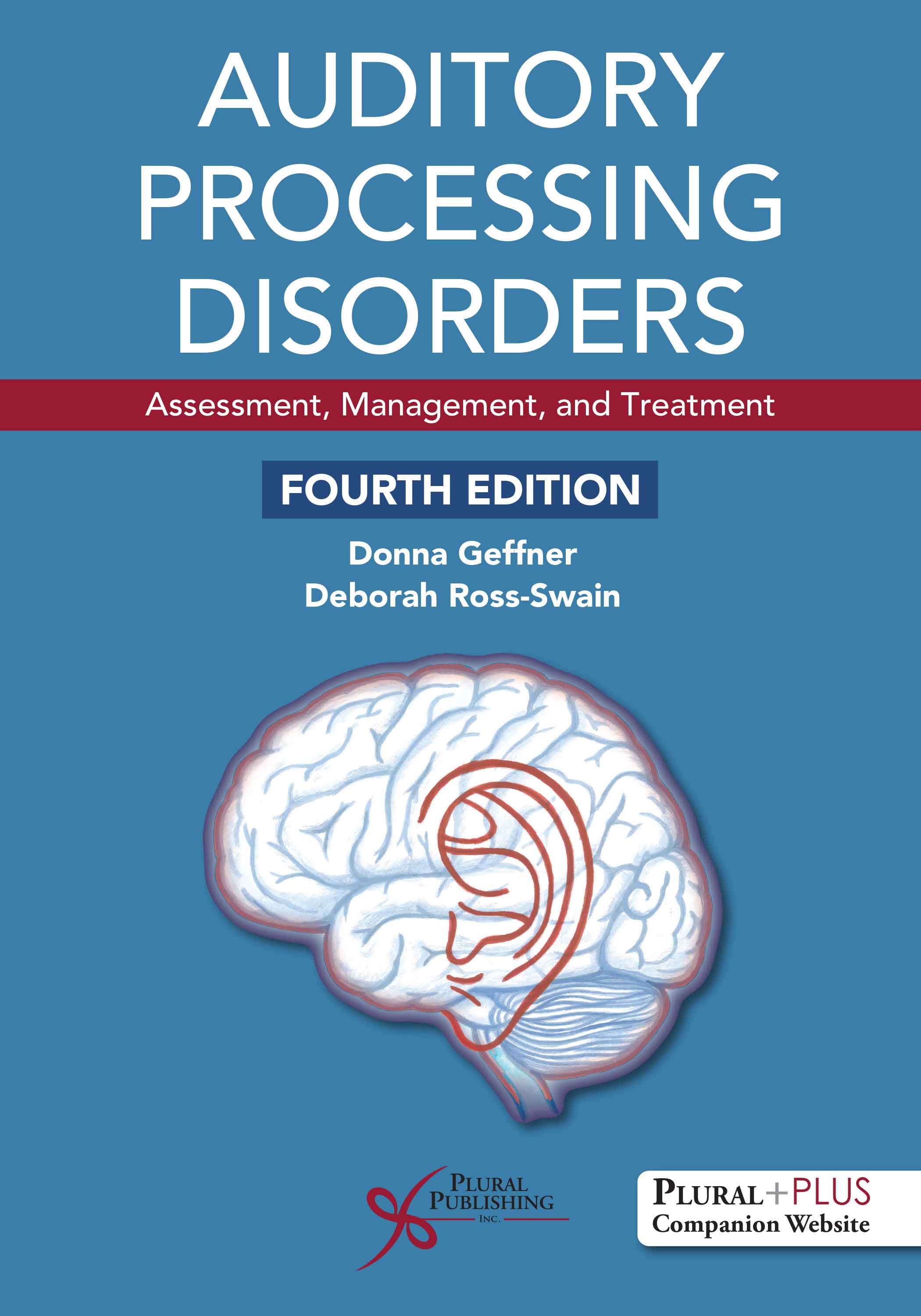
Auditory Processing Disorders: Assessment, Management, and Treatment
Fourth Edition
Donna Geffner, Deborah Ross-Swain
Details: 574 pages, B&W, Softcover, 7" x 10"
ISBN13: 978-1-63550-654-9
© 2026 | Available
For Instructors
Purchase
With eight new chapters and many other updates, Auditory Processing Disorders: Assessment, Management, and Treatment, Fourth Edition details the definition, behaviors, and comorbidities of auditory processing disorders (APD) while educating the reader on the most current global practices for assessment of APD, including its impact on literacy and language processing. Practical rehabilitation, management strategies, and direct evidence-based treatment programs, including the use of technology, are covered in detail. The text is a highly practical book designed specifically for practicing clinicians, instructors, and students, in both audiology and speech-language pathology. It contains a comprehensive review of APD and is also an excellent resource for parents, teachers, and other professionals wishing to learn more about APD for themselves, their child, and their practice.
New to the Fourth Edition
- New chapters on:
- the effects of COVID-19, RSV, PANDAS, autoimmune disorders and other medical issues on APD
- evaluating APD through telepractice
- the collaboration of the audiologist and speech-language pathologist in evaluating auditory processing skills and other listening problems
- treatment interventions for deficit-specific processing disorders and other auditory skills
- differentiation between auditory processing and listening disorders
- an integrative model for auditory, linguistic, and cognitive processes
- listening difficulties in the classroom, and how to differentiate them from APD
- identification and treatment of dichotic deficits
- Updated chapter on auditory neuropathy
- Updated chapter on current neuroscience on the relationship between auditory processing and literacy
- Description of new digital module technology for sound enhancement
- Updated apps for interventions for APD
Key Features
- Contributions from the field’s most recognized experts, such as Martha S. Burns, Sharon Cameron, Harvey Dillon, Jeanane M. Ferre, James W. Hall, III, Jack Katz, Angela Loucks Alexander, Larry Medwetsky, Deborah Moncrieff, and Gary Rance
- Case studies illustrating the pansensory nature of an APD and the importance of multidisciplinary collaboration
- An integrative model for understanding APD utilizing research from cognitive neuroscience, neurophysiology, neurobiology, mathematics, and neuroanatomy
- A model of speech understanding to differentiate APD from non-auditory deficits and listening problems
From the Foreword
"As the editors/authors embark on this latest edition of the textbook on auditory processing disorders, we find ourselves at the intersection of tradition and innovation. Leading clinicians and researchers, driven by a passion for advancing our scope of understanding and comprehension of auditory processing, have joined forces to present the most comprehensive edition to date. The culmination of their efforts provides a cutting-edge resource for professionals in audiology, speech-language pathology, psychology, and cognitive neuroscience.
Divided into three sections— Identification and Assessment, Management, and Treatment and Intervention Programs—this text is a testament to the collaborative spirit driving the field forward. Drawing upon the latest research and clinical expertise, the international authors guide the reader through the intricate processes and neurophysiology that underlie effective listening, communication, and learning. Recognizing that numerous factors can impact successful processing and listening, from neural transmission to cognitive and behavioral issues, the authors emphasize the need for a thorough assessment to pinpoint the specific processing systems affected, which then can assist in decisions related to treatment interventions, management, educational placement and programs.
In the pursuit of understanding the underlying pansensory effects of auditory processing disorders, the text introduces new assessment approaches and advocates for an interdisciplinary, collaborative model. Audiologists, speech-language pathologists, psychologists, and cognitive neuroscientists, come together, armed with various tools, knowledge, expertise, and practices to identify and comprehend the intricacies of processing-related difficulties. This collaborative approach allows for the derivation of individualized recommendations, ensuring that interventions meet the unique needs of each client.
The journey through this text concludes with the presentation of novel approaches to address auditory and spoken-language processing and related listening disorders with a valuable compilation of resources and websites. The practitioners engaging with this text will find themselves equipped with the knowledge and tools to navigate the ever-evolving landscape of auditory processing, assessments and intervention.This edition places the professional on the cutting edge of auditory, spoken-language processing and related listening challenges, empowering them to address the specific listening needs of clients with expertise, compassion, and innovation. The international contributing authors are well respected in their field and the book reads like a “Who’s Who” in auditory processing. Each author brings an element of new information and expertise, expansive thinking, and innovation. As the field continues to evolve, and as this textbook has evolved from the first edition (2007) to this fourth, so too, will our understanding and knowledge. This text serves as a beacon guiding us towards greater clarity and efficacy in the assessment and intervention of auditory and spoken-language processing and related listening disorders."
—Jack Katz, PhD
Professor Emeritus, University of New York at Buffalo
Research Professor, University of Kansas Medical Center
Director, Auditory Processing Service
Kansas City, MO
PluralPlus Online Ancillaries
For instructors: Image Bank
For students: Forms/Documents
Foreword
Preface
Contributors
Section I. Identification, Assessment and Management
Chapter 1. Central Auditory Processing Disorders: Definition , Description , Behaviors, and. Co-morbidities
Donna Geffner
Chapter 2. An Integrative Model for Understanding Auditory, Linguistic, and Cognitive Processes in Spoken Language-Processing and Associated Listening Disorders
Larry Medwetsky
Chapter 3. Audiologic Assessment of Auditory Processing Disorders in Children and Adults
James W. Hall III and Mazen K. El-Banna
Chapter 4. Causes of Listening Difficulties in the Classroom - A Model of Speech Understanding to Differentiate Auditory Processing Disorders from Non-Auditory Deficits
Sharon Cameron and Harvey Dillon
Chapter 5. Auditory Neuropathy: auditory processing consequences and management options
Gary Rance and Julien Zanin
Chapter 6. Speech-Language Pathologist’s Role in the Assessment of APD and Listening Problems
Deborah Ross-Swain
Chapter 7. Collaboration between the Audiologist and Speech-Language Pathologist for Auditory Processing Disorders and Listening Problems
Deborah Ross-Swain, John J. Wicker and Michelle D’Mello
Chapter 8. Auditory Processing and How the Brain Reads: Language, Cognition, and Temporal Processing
Martha S. Burns
Chapter 9. Neuropsychological Evaluations: Differentiating Between Auditory Processing and Related Complexities
Michelle Limon Freeman and Daniel B. Peters
Chapter 10. The Impact of Otitis Media on the Central Auditory System and Central Auditory Processing
Jack Katz, Thomas R. Zalewski and Michael J. Brenner
Chapter 11. Auditory Processing, Autoimmunity and other Medical Condition
Jeannie M. Lopez
Chapter 12. Evaluating Auditory Processing Abilities Through Telepractice
Angela Loucks Alexander and Fatima Abbas.
Section II. Management
Chapter 13. Management strategies and Sound Enhancement
Donna Geffner
Section III. Treatment and Intervention Programs
Chapter 14. Identification and Treatment of Dichotic Deficits
Deborah Moncrief
Chapter 15. Acoustic Pioneer and Auditory Processing
Matthew Barker
Chapter 16. Accessing Technology to treat auditory processing disorders: Computer-based auditory training (CBAT)
Jeanane M. Ferre and Courtney Baker
Chapter 17. Applicable Applications: Treatment and Technology with Practical, Efficient, and Affordable Solutions
Bunnie Schuler
Chapter 18. Resources and Websites
Lindsay Lerro
Appendix A. Auditory Processing Disorder: Tips for Parents
Donna Geffner and Deborah Ross-Swain
Appendix B. Auditory Processing Disorder: Tips for Teachers
Donna Geffner and Deborah Ross-Swain
Index
Auditory Processing Disorders Assessment, Management, and Treatment, Fourth Edition comes with access to supplementary student and instructor resources on a PluralPlus companion website.
The companion website is located at: https://www.pluralpublishing.com/publication/APD4E
STUDENTS:
The student resources include downloadable resources from text.
To access the student resources, you must register on the companion website and log in using the access code located in the front of your textbook.
INSTRUCTORS:
The instructor resources include image bank. You will also have access to all of the student resources listed above.
To access the instructor resources, you must contact Plural Publishing, Inc. to be verified as an instructor and receive your access code.
Email: instructormaterials@pluralpublishing.com
Tel: 866-758-7251 (toll free) or 858-492-1555
*Note for students: If you have purchased this textbook used or have rented it, your access code will not work if it was already redeemed by the original buyer of the book. Plural Publishing does not offer replacement access codes for used or rented textbooks.
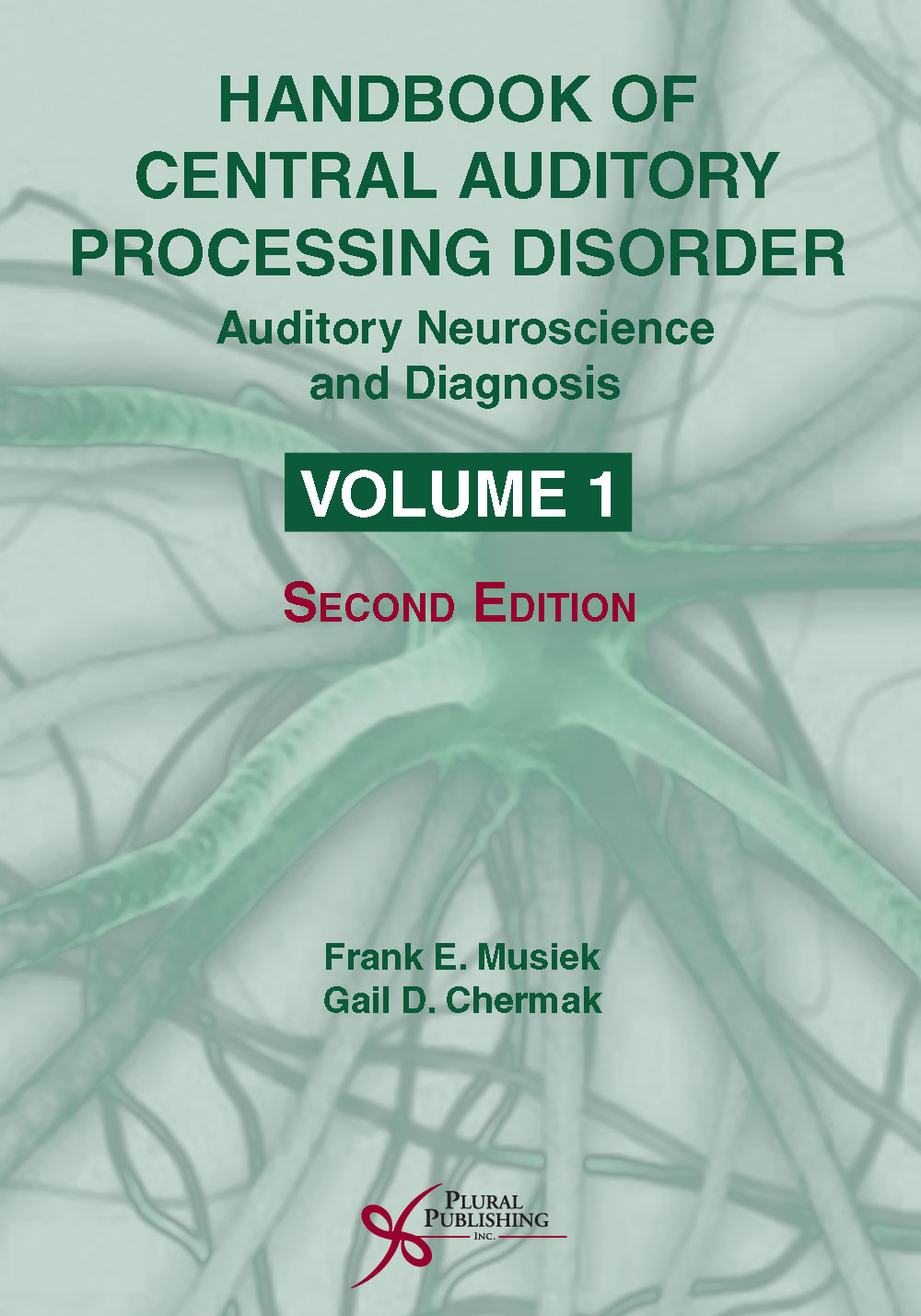
Handbook of Central Auditory Processing Disorder, Volume I: Auditory Neuroscience and Diagnosis
Second Edition
Frank E. Musiek, Gail D. Chermak
Details: 768 pages, B&W, Hardcover, 7" x 10"
ISBN13: 978-1-59756-561-5
© 2014 | Available
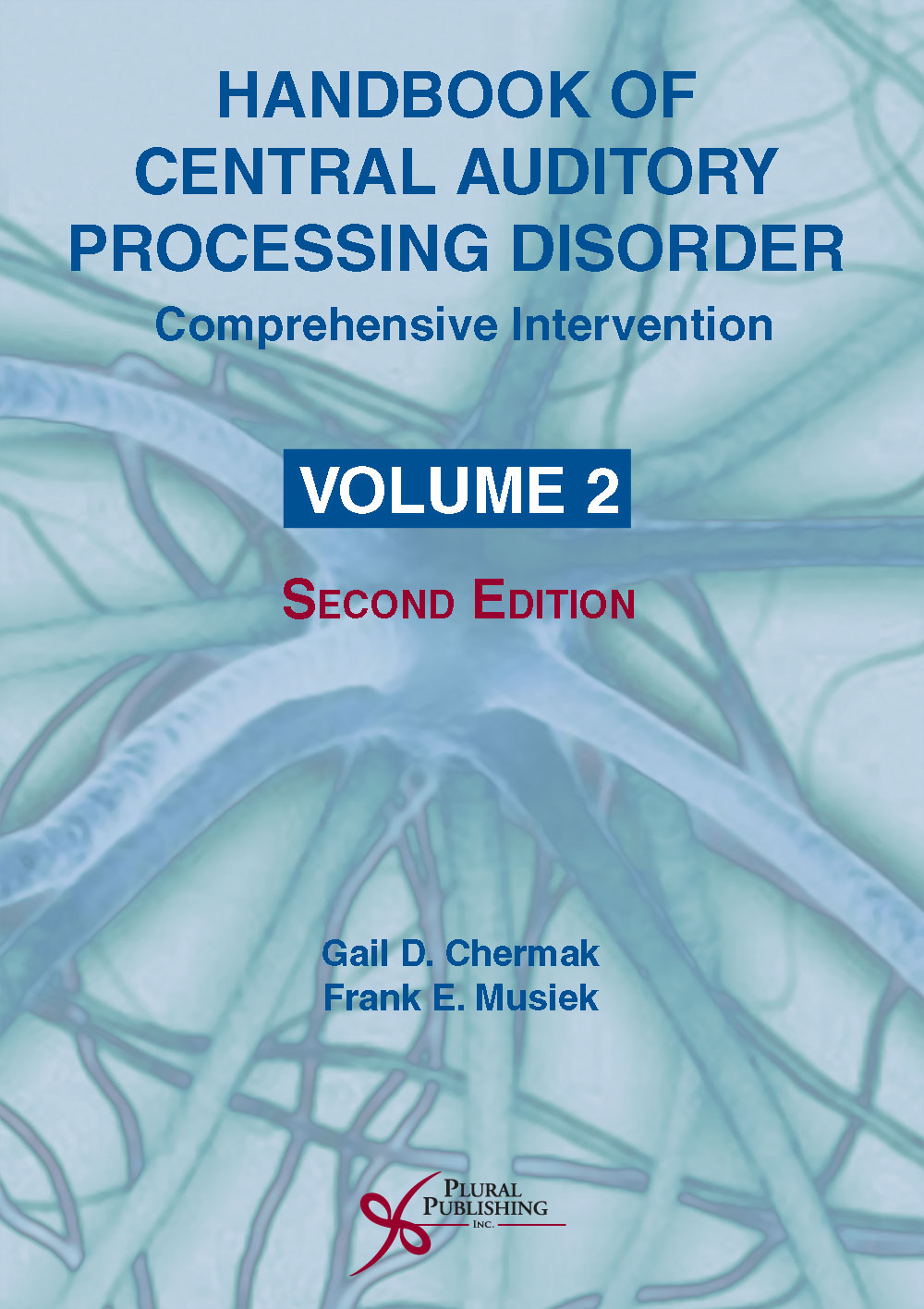
Handbook of Central Auditory Processing Disorder, Volume II: Comprehensive Intervention
Second Edition
Gail D. Chermak, Frank E. Musiek
Details: 792 pages, B&W, Hardcover, 7" x 10"
ISBN13: 978-1-59756-562-2
© 2014 | Available
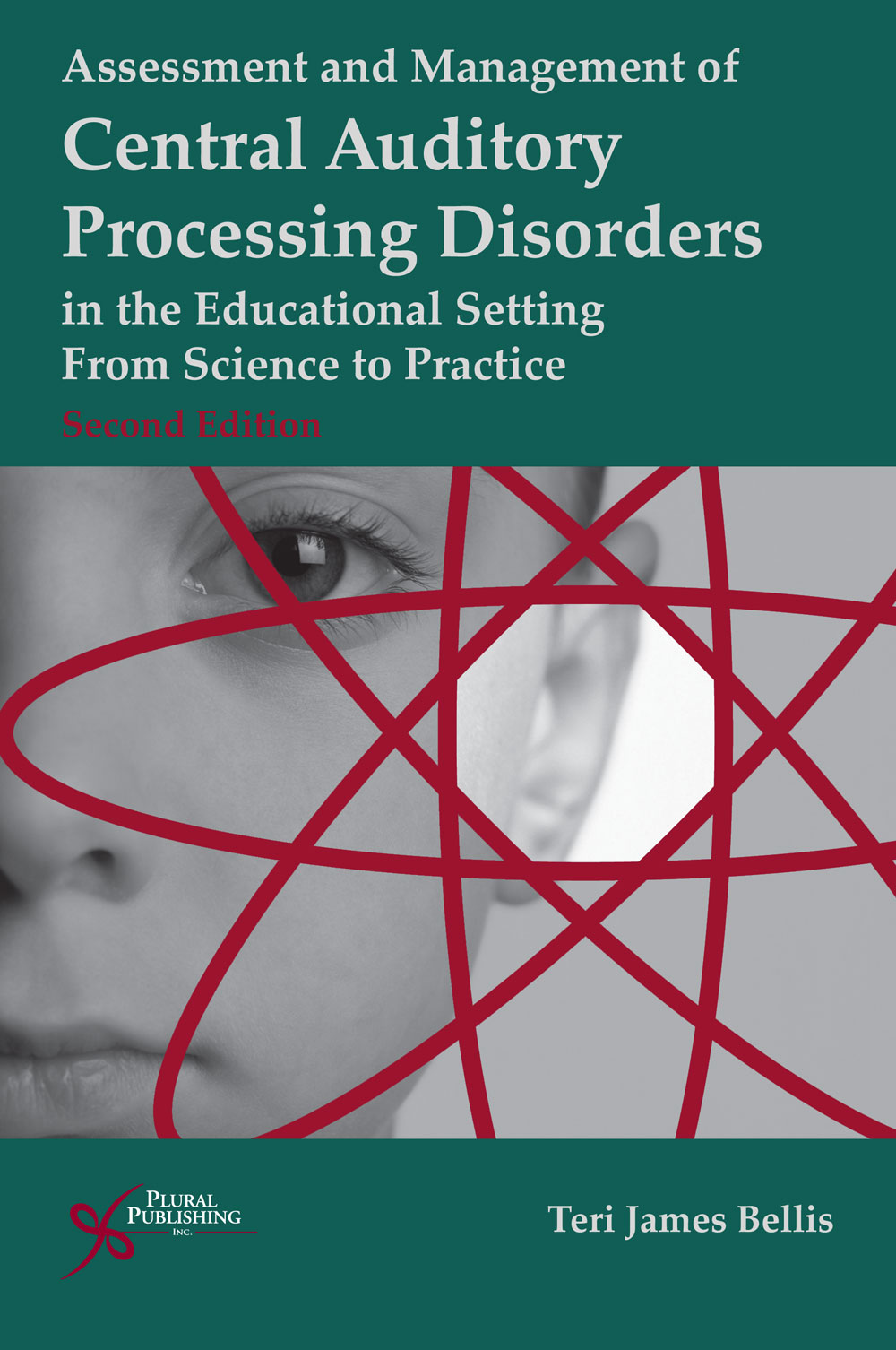
Assessment and Management of Central Auditory Processing Disorders in the Educational Setting: From Science to Practice
Second Edition
Teri James Bellis
Details: 532 pages, B&W, Softcover, 7" x 10"
ISBN13: 978-1-59756-451-9
© 2011 | Available
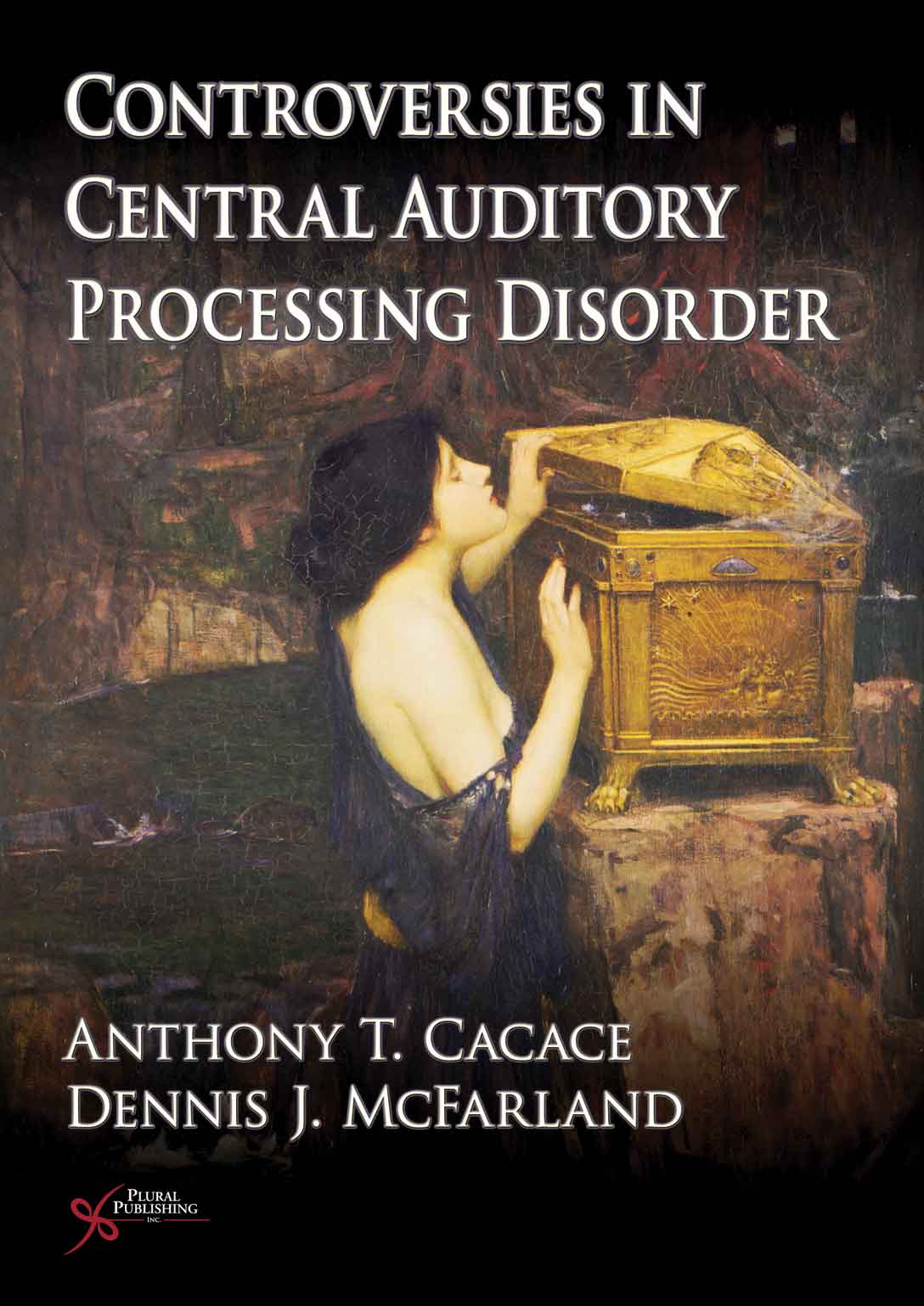
Controversies in Central Auditory Processing Disorder
First Edition
Anthony T. Cacace, Dennis J. McFarland
Details: 550 pages, B&W, Hardcover, 7" x 10"
ISBN13: 978-1-59756-260-7
© 2009 | Available


